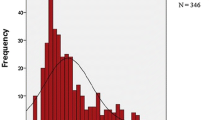Abstract
Objective
To provide an objective reference for the syndrome types of Chinese medicine (CM) associated with pediatric primary nephrotic syndrome (PNS).
Methods
A cross-sectional study was performed. Data on clinical symptoms, CM syndrome types, biochemical indices, and medications used were collected from 98 children with PNS. Then, the correlation between CM syndromes and biochemical indices, as well as medications used, was analyzed.
Results
The four most common symptoms in children with PNS were brown urine, red tongue, excessive sweating, and swelling of the face and limbs. The syndromes of qi deficiency of Fei (Lung) and Shen (Kidney) (FSQD) and yin deficiency of Gan (Liver) and Shen (GSYD) were the most common main CM syndrome types. FSQD syndrome score correlated significantly with the total cholesterol level, urine protein/creatinine ratio, and urine IgG and albumin levels (P<0.01 or P<0.05). The use of maintenance glucocorticoids combined with immunosuppressive agents correlated with FSQD syndrome, and the use of maintenance glucocorticoids alone correlated with GSYD syndrome (P<0.05).
Conclusion
Two of the most common CM syndrome types were FSQD and GSYD syndromes. FSQD syndrome may be caused by some factors related to lipid levels, protein loss, and the use of immunosuppressive agents. The use of maintenance glucocorticoids may cause GSYD syndrome
Similar content being viewed by others
References
Hall AS, Thorley G, Houtman PN. The effects of corticosteroids on behavior in children with nephrotic syndrome. Pediatr Nephrol 2003;18:1220–1223.
Yun Y, Gao Y, Ma YH, Liu WL, Zhao M, Gao ZM. clinical study of Gushen Tablet in reducing children’s nephrotic syndrome relapse. Chin J Integr Med 2003;9:185–190.
Chen Y, Gong Z, Chen X, Tang L, Zhao X, Yuan Q, et al. Tripterygium wilfordii Hook F (a traditional Chinese medicine) for primary nephrotic syndrome. Cochrane Database Syst Rev 2013;8:CD008568.
Feng M, Yuan W, Zhang R, Fu P, Wu T. Chinese herbal medicine Huangqi type formulations for nephrotic syndrome. Cochrane Database Syst Rev 2013;6:CD006335.
Hogg RJ, Furth S, Lemley KV, Portman R, Schwartz GJ, Coresh J, et al. National Kidney Foundation’s Kidney Disease Outcomes Quality Initiative clinical practice guidelines for chronic kidney disease in children and adolescents: evaluation, classification, and stratification. Pediatrics 2003;111:1416–1421.
Nephrology Group, Chinese Pediatric Society, Chinese Medical Association. The clinical classification of glomerular disease and the treatment of nephrotic syndrome in children. Chin J Pediatr (Chin) 2001;39:746–747.
State Administration of Traditional Chinese Medicine of the People’s Republic of China. Chinese medicine industry standard of the people’s Republic of China • The standard for TCM diseases and syndromes therapeutic results. Nanjing: Nanjing University Press; 1994:40.
Xu DH, Xu JQ, eds. Quantitative diagnosis of traditional Chinese medicine. Nanjing: Quantitative diagnosis of traditional Chinese Medicine;1997:99-103,112–137.
Sun W, Zhu Z, Yu J, Wang YH, Xiong M, Gao X, et al. Effects of Chinese herbal medicine Huaiqihuang Granule on nephrin and podocin expressions of slit diaphragmassociated molecules in adriamycin-induced nephrotic rats. J Chin Integr Med (Chin) 2011;9:546–552.
Sun W, He YR, Yu J, Lin YY, Wang YH, Gao X, et al. Effect of Yiqiyangyin Recipe on heparanase and nephrin in rats with adriamycin-induced nephropathy. J Tradit Chin Med 2013;33:334–342.
Wei L, Ye R, Luan T, Lu R, Chen B. Long-term effect of TCM decoctions in treatment of nephrotic syndrome. J Tradit Chin Med 2002;22:83–86.
Author information
Authors and Affiliations
Corresponding author
Additional information
Supported by Shanghai Municipal Commission of Health and Family Planning (No. 2010QL031B)
Electronic supplementary material
11655_2017_2961_MOESM1_ESM.pdf
Supplementary material to “Preliminary Research on Syndrome Types of Chinese Medicine in Children with Primary Nephrotic Syndrome”
Rights and permissions
About this article
Cite this article
Sun, W., Yu, J., Zeng, Gl. et al. Preliminary Research on Syndrome Types of Chinese Medicine in Children with Primary Nephrotic Syndrome. Chin. J. Integr. Med. 24, 579–583 (2018). https://doi.org/10.1007/s11655-017-2961-3
Accepted:
Published:
Issue Date:
DOI: https://doi.org/10.1007/s11655-017-2961-3




